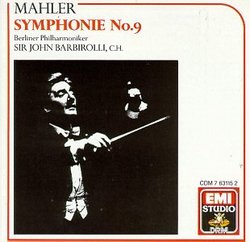| All Artists: Gustav Mahler, Sir John Barbirolli, Berlin Philharmoniker Title: Mahler: Symphony No. 9 Members Wishing: 0 Total Copies: 0 Label: EMI Studio DRM Release Date: 7/18/1989 Genre: Classical Styles: Historical Periods, Modern, 20th, & 21st Century, Symphonies Number of Discs: 1 SwapaCD Credits: 1 UPC: 077776311524 |
Search - Gustav Mahler, Sir John Barbirolli, Berlin Philharmoniker :: Mahler: Symphony No. 9
 | Gustav Mahler, Sir John Barbirolli, Berlin Philharmoniker Mahler: Symphony No. 9 Genre: Classical
|
Larger Image |
CD DetailsSimilar CDs
|
CD ReviewsA visionary performance Ray Barnes | Surrey, British Columbia Canada | 03/21/2000 (5 out of 5 stars) "It is my pleasure and honor to be the first to review this recording. To be candid I'm also quite astounded to hold this position as this performance was originally recorded in 1964 and remastered digitally in 1989. It has been available for a very long time. To the best of my knowledge and belief, this was the first recording the Berlin Philharmonic Orchestra made of this score, as in the early 1960s Herbert von Karajan performed little or no Mahler, and prior to Karajan, Wilhelm Furtwangler also generally avoided this composer. To my ears this score has particularly original writing for the string section, ranging from the sparse opening chords - sounding almost like Webern - to the impassioned tutti passages. The BPO strings respond magnificently to the challenge of this score, as do the rest of the orchestra. One almost feels listening to this CD that the BPO players wanted to prove to the world they could play this score as well as the VPO under Bruno Walter, the Concertgebouw, or any other first rank ensemble. Barbirolli's reading is full of the warmth and humanity that marked his performance of the 5th Symphony, and according to the editors of the Penguin Guide he made a very favourable impression on the orchestra. The noble final movement was recorded first. His tempi are neither too slow nor fast, and details in the part-writing are heard to good effect. The sound is perhaps not quite as transparent as Solti's 9th with the Chicago Symphony, but it is excellent. The first Karajan recording of this work with the BPO has somewhat better sound but no better orchestral playing. In any case no allowances need to be made for the age of the recording itself. This performance has also been very generously fitted onto one CD at low to mid-price range. It is a formidable bargain." WHO SAID THAT ART COULD ONLY BE BEAUTIFUL? demien | U.S.A. | 09/04/2000 (5 out of 5 stars) "Gustav Mahler began work on the Ninth symphony in 1908 and completed it in 1909. Mahler was reluctant to complete the work because of his suspicion that all composers signed their death warrant once they completed their 9th symphony. The demise of Beethoven and Bruckner only helped to confirm this suspicion. Death would indeed strike down Gustav Mahler only two years after he completed this tour de force. Mahler's famous pupil Bruno Walter would give the first performance of the ninth on June 26,1912. The Ninth symphony consists of four movements scored in different keys and presents mans deepest fears with a pungent bare honesty equal to that of a innocent child. Sir John Barbirolli was noted for his profound heartfelt devotion to the music of Gustav Mahler and the Berlin Philharmonic turn out to be the perfect component in this recording. The schizophrenic emotions of the first movement are manifest and striking. Berlin then provides stylish imaginative ensemble work to convey the ludicrous self parody of the second movement and the demented counterpoint of the third movement. The grotesque image of death which defines the final movement is played with a sinister radiant beauty that captivates the senses and makes the heart cry. The horrid creature is unveiled and what a wonderful glory it is. Essential." Barbirolli's Mahler Ninth is unusually gentle, but just as m Santa Fe Listener | Santa Fe, NM USA | 07/23/2006 (5 out of 5 stars) "You'd never suspect while listening to Barbirolli's Ninth that Mahler is a difficult composer. The complexity of this symphony is extreme for both conductor and orchestra. That leads many interpreters to over control the music and underline every detail (e.g., Benjamin Zander in his Telarc recording with the Philharmonia). That wasn't Barbirolli's way. Mahler is like Schubert to him, a composer of warmth and unaffected feelings. In his hands the great first movement flows without rhythmic complications. Even the most turbulent eruptions are sweet-sounding. It may not exactly be true to the letter of the score, but how ravishing. (Admitedly, he made other recordings, particularly of the Mahler Sixth, that are not at all genial.)
Likewise, the Scherzo is devoid of satiric edge and emotional extremes. Barbirolli was always good at waltzes and dance music in general. He gives us a quick dance tempo that's almost lilting. Is it right to deprive Mahler of his neurotic polarities? Strictly speaking, no, but the result is sunny and enjoyable. Having gotten this far, you begin to wonder if Barbirolli is going to make nice in the savage Rondo-Burleske, too. As it turns out, he's much less frenetic than anyone else, even Bruno Walter, and with the Berlin Phil. sounding less than virtuosic (they hadn't yet learned the work under Karajan), this is the weakest movement. Many conductors lean ponderously into the great Adagio, making it sound like end-of-the-world music. Barbirolli goes for less intensity, more natural lyricism. In the singing style he's chosen, the music is still moving, if much less wrenching. At 23 min. his tempo isn't among the slowest, either, so there's no protracted agony of the kind Levine and Bernstein evoke. In sum, Barbirolli managed to make this music his own just as much as Walter, Bernstein, and Horenstein did. He is the gentlest of the three. EMI's latest remastering of the original analog sound from 1964 is a great improvement, so do buy it instead of the origianl CD shown here. " |

 Track Listings (4) - Disc #1
Track Listings (4) - Disc #1